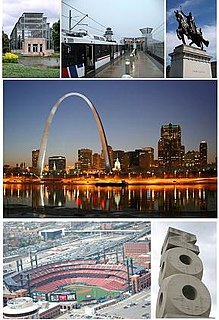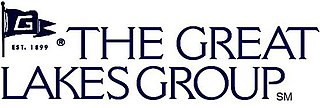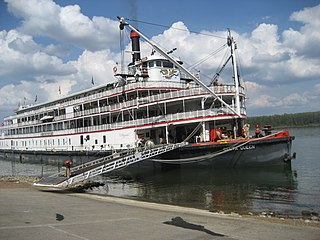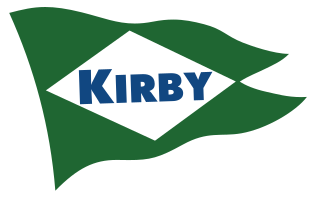
The American Waterways Operators, is the national trade association for the U.S. tugboat, towboat and barge industry. [1]

A tugboat is a type of vessel that maneuvers other vessels by pushing or pulling them either by direct contact or by means of a tow line. Tugs typically move vessels that either are restricted in their ability to maneuver on their own, such as ships in a crowded harbor or a narrow canal, or those that cannot move by themselves, such as barges, disabled ships, log rafts, or oil platforms. Tugboats are powerful for their size and strongly built, and some are ocean-going. Some tugboats serve as icebreakers or salvage boats. Early tugboats had steam engines, but today most have diesel engines. Many tugboats have firefighting monitors, allowing them to assist in firefighting, especially in harbors.

A barge is a flat-bottomed ship, built mainly for river and canal transport of heavy goods. Some barges are not self-propelled and must be towed or pushed by towboats, canal barges or towed by draft animals on an adjacent towpath. Barges contended with the railway in the early Industrial Revolution, but were outcompeted in the carriage of high-value items due to the higher speed, falling costs and route flexibility of railways.
Contents
For more than 60 years AWO has promoted the contribution of the domestic waterways transportation industry to the U.S. economy. AWO acts as the principal advocate for the U.S. tugboat, towboat and barge industry in Washington, D.C. with key policymakers and federal officials.

Washington, D.C., formally the District of Columbia and commonly referred to as Washington or D.C., is the capital of the United States. Founded after the American Revolution as the seat of government of the newly independent country, Washington was named after George Washington, the first President of the United States and a Founding Father. As the seat of the United States federal government and several international organizations, Washington is an important world political capital. The city is also one of the most visited cities in the world, with more than 20 million tourists annually.
AWO maintains regional offices in Seattle, St. Louis, New Orleans, and Washington, D.C. These offices manage state legislative and regional regulatory issues and maintain an effective grassroots network for congressional advocacy.

Seattle is a seaport city on the West Coast of the United States. It is the seat of King County, Washington. With an estimated 730,000 residents as of 2018, Seattle is the largest city in both the state of Washington and the Pacific Northwest region of North America. According to U.S. Census data released in 2018, the Seattle metropolitan area's population stands at 3.87 million, and ranks as the 15th largest in the United States. In July 2013, it was the fastest-growing major city in the United States and remained in the Top 5 in May 2015 with an annual growth rate of 2.1%. In July 2016, Seattle was again the fastest-growing major U.S. city, with a 3.1% annual growth rate. Seattle is the northernmost large city in the United States.

St. Louis is a major independent city and inland port in the U.S. state of Missouri. It is situated along the western bank of the Mississippi River, which marks Missouri's border with Illinois. The Missouri River merges with the Mississippi River just north of the city. These two rivers combined form the fourth longest river system in the world. The city had an estimated 2017 population of 308,626 and is the cultural and economic center of the St. Louis metropolitan area, which is the largest metropolitan area in Missouri, the second-largest in Illinois, and the 20th-largest in the United States.

New Orleans is a consolidated city-parish located along the Mississippi River in the southeastern region of the U.S. state of Louisiana. With an estimated population of 393,292 in 2017, it is the most populous city in Louisiana. A major port, New Orleans is considered an economic and commercial hub for the broader Gulf Coast region of the United States.
Organized in Washington, D.C. in 1944, AWO now has over 300 member companies that serve the diverse needs of U.S. shippers and consumers. AWO members operate throughout the United States on America's rivers, canals, in its ports and harbors, on the Great Lakes, and on the Atlantic, Pacific and Gulf coasts.

A consumer is a person or organization that uses economic services or commodities.

A river is a natural flowing watercourse, usually freshwater, flowing towards an ocean, sea, lake or another river. In some cases a river flows into the ground and becomes dry at the end of its course without reaching another body of water. Small rivers can be referred to using names such as stream, creek, brook, rivulet, and rill. There are no official definitions for the generic term river as applied to geographic features, although in some countries or communities a stream is defined by its size. Many names for small rivers are specific to geographic location; examples are "run" in some parts of the United States, "burn" in Scotland and northeast England, and "beck" in northern England. Sometimes a river is defined as being larger than a creek, but not always: the language is vague.

A port is a maritime commercial facility which may comprise one or more wharves where ships may dock to load and discharge passengers and cargo. Although usually situated on a sea coast or estuary, some ports, such as Hamburg, Manchester and Duluth, are many miles inland, with access from the sea via river or canal.
AWO is governed by an elected body of 52 members who serve on the association's Board of Directors. The Board is responsible for development and approval of policy and strategy.











